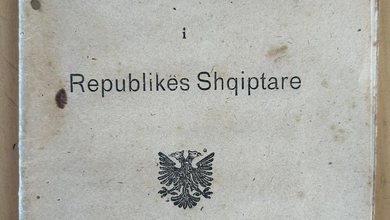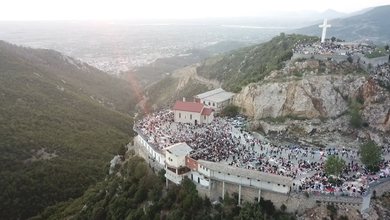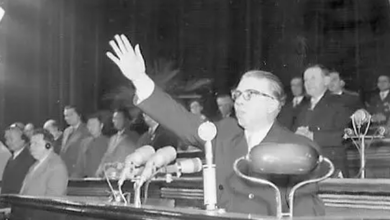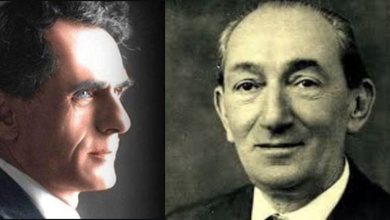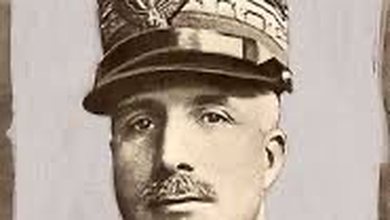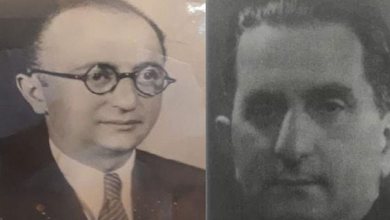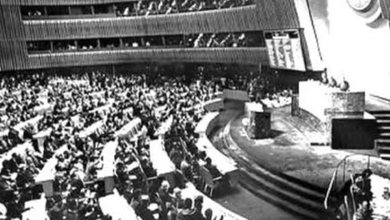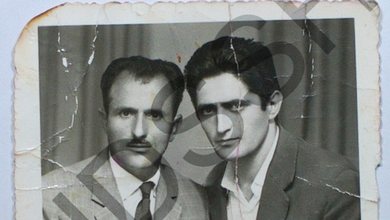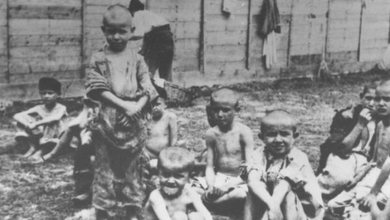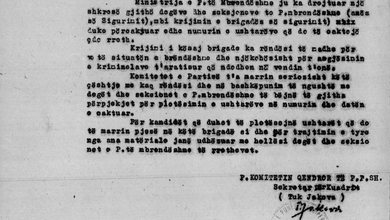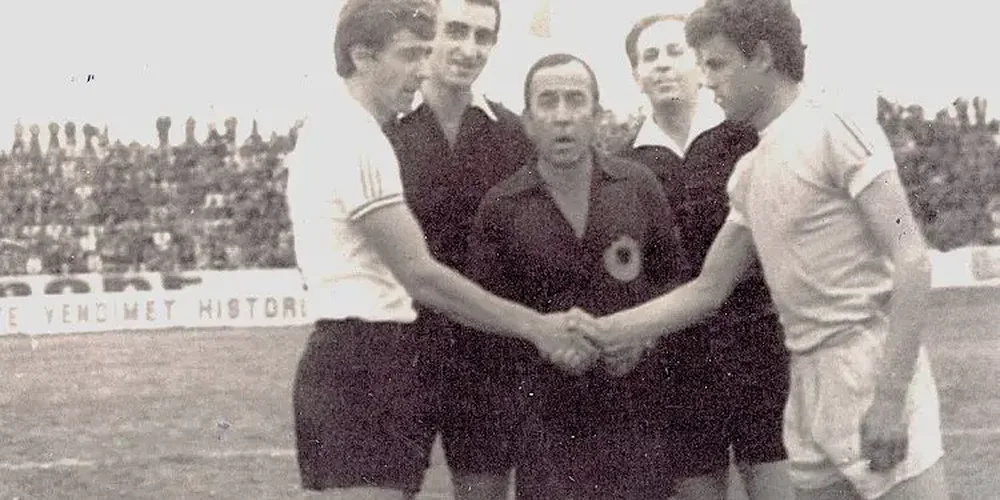
The Konçi family is a well-known name not only in sports circles, but also beyond. From the professor, coach, and prominent personality Zyber Konçi, doctor Xhavit Konçi, Agimi, the dancer of the Song and Dance Ensemble, and Lulzim Konçi, a physical education staff member and FIFA football referee. Today, in her 80s, both in Tirana and New York, the girl, Konçi, as her friends and comrades call her, along with her coffee, smokes a cigarette, as she used to, without exaggerating. A life divided between football, an educator in several schools in Tirana, a referee, and then an observer, until she retired from active sports. “In Beijing, during the match, I asked our football players to cause a deliberate foul, so that I could show them the card, but they opposed me, refused, were afraid,” recalls Konçi.
Konçi, how did you start your refereeing career?
Initially, I was a footballer, a midfielder with the youth team of “Tirana” then with “Dinamo”. From the 1965s, I started attending the Refereeing Sector and here my career as a football referee began. From the First Category, then FIFA in the early 1970s until I finished around 1990. I am a referee of the generation educated by Ramiz Kuka, Sami Kotherja, etc.
Have you led many meetings, even in China?
Of course. Both in national and international championships, including meetings with clubs or various tournaments, like the one in Sofia 1979, (the World Championship qualifiers) for youth in August 1979. Even in the Far East, as you remember, in the summer of 1974.
You left for the People's Republic of China at that time...
Along with the youth representative team that was going to leave for that friendly tournament, the AFF also appointed me as a referee.
Was there a reward? How were you treated financially?
From the first match I refereed, the Chinese liked me, who, as they said, “the level of the Albanian referee is quite high and we need to learn from him”. After that, I refereed all the matches and the local assistants alternated. Of course, there was a difference in refereeing too. There was no financial reward, while they had put a car at my disposal.
How did you communicate with the assistants?
Just a few words that we learned there, like “zoshang ho” (good morning), “ni ho ma” (how are you), “peng” (friend), “tunze” (comrade), “hao i” (good night), “la zhel” (come here). I remember that during the breaks in the meetings, they would bring us oranges and other refreshing drinks, because it was very hot.
We are in the period after the Nixon-Mao Zedong meeting, what political atmosphere prevailed?
In the 1970s, relations had begun to change, but during that month, we did not see or notice any moment where complicated or tense situations could arise. Wherever they went, a great spirit of "unbreakable friendship", as it was said at that time, accompanied us.
Coming to the cardboard, how did you come up with the idea?
Receiving information that cards had not yet found application in China, this was due to the fact that China was not a member of FIFA. Chinese football in those years, for political reasons, was disconnected, isolated from the larger sporting world, without participation with clubs, national teams in major world events.
Did you show your card in the meetings held?
No, because in those matches there was no possibility of issuing cards. The meetings were held in a high spirit of friendship and understanding. We were oriented to behave correctly, as were the Chinese. Although in a friendly that we saw in Chiancin, somewhere, between a Chinese and Vietnamese military team, a mess without any punishment.
And to make it concrete…?
The idea of issuing a yellow card started to bother me, but I had to find the moment and improvise something. I couldn't do it with the Chinese, I had to provoke our players, so that I could demonstrate it publicly.
We're in Beijing and the last match was being played, right?
During the week, with Refik Resmen and Nimet Merhori, they discussed in the hotel room, telling them that as something new for the World Cup, the yellow card, it would be good to bring it out here, so that the Chinese would also be familiar with it. But they did not agree.
“Don't confuse us,” said the Security officer who accompanied us. But, I had decided and the night before the match, Refik tells the Security officer, that; “this one has decided to issue a yellow card tomorrow”!
Did you tell the players?
I didn't tell anyone, except for the translator Lin, to whom I told that if I were to issue a yellow card, the goal was to make FIFA's news known in China as well.
Were there any rejections or objections?
The match took place at 10 pm, due to the high temperatures and for this reason the matches were played late. During the game, I told the players, from captain Starova, to Tit Hysen (our flag bearer), to cause fouls as defenders. But no one dared and did not accept.
"Why me - said one, - no, I don't foul the Chinese, they will punish us..." - said the other. They were afraid. During the first 45 minutes, this debate continued. It was really a mess, because a serious intervention could be considered an act that could even violate friendship...!
And who was the "victim" player?
In the second half, when Dion Kushe, an honest player, interfered with an attacker, I whistled loudly and long, so the game stopped. Without hesitation, running, I took out the yellow card that FIFA had brought me from the right pocket of my pants and with my hand outstretched, very visibly, I pointed it at Kushe. He was surprised, but did not speak, because the matches had discipline. He even went to the lying player, hugging him and apologizing.
So you are the first referee of a card?
I remember that the 100 thousand spectators burst into applause, because they had never seen such an action. Meanwhile, the Voice Center began to explain in their own language, that; "the Albanian referee, Konçi, has issued the yellow card, which has begun to be applied by FIFA after the Mexico World Cup. This card is given as a warning to footballers who violate the regulations."
Were you excited?
Of course, and greeting them, I returned from the stands thanking them and bowing with my right hand to my heart. The game was stopped for a few minutes and it resumed after the medical staff left the field, who came to help the injured player. He was the first and last card. If I hadn't taken him out there, I wouldn't have had another chance.
How did the game end?
As I said, this was the last match of the 9 matches of the tournament and it took place at the “Workers” Stadium in Beijing. The national youth team, like us, was in front, and it ended 2-1 for our team, with two goals, if I’m not mistaken, from Metan. Although the results, as was known, were determined by friendship, we won some of them.
What is the story with Mexican dancers in China?
We were in Beijing, when in our hotel, the best at that time, with 12 floors, on the third floor were the translators, the escorts, we were on the 10th. An artistic group comes there, with beautiful Mexican girls. The ensemble was called "Juvenilja".
They spoke Italian and our boys fell in love with them. One night they had arranged to meet, and as they were coming down the emergency stairs, they were discovered.
How did it continue afterwards?
The Sigurimi employee had heard a noise and, on his way out, had seen them sneaking away with them. He alerted us, we went out, but they ran away. The headquarters was called, and a meeting was held at 2:00 in the morning at the hotel.
Precisely at that time, an Albanian student had fallen in love with a foreigner and as punishment, she was isolated in the embassy and returned to Albania by steamer, a 6-month journey.
They had a heated discussion about our players, “These are for prison,” the Sigurimi employee shouted. “No,” Resmja objected, “they are the children of our friends.” “If you talk to those ballerinas again, we will send you to Tirana,” they ordered, and the matter was closed.
What else do you remember from that tour?
The trip, departure from Tirana to Iran, then to Beijing. The planes without air conditioning, the long journey, the air was getting in. "The plane is burning", someone would shout in fear. There we spoke a little Italian and a few words of Chinese. I remember Ilir Bushati when he dribbled past the opponents and Resmen who got angry with him.
Or when they sent us to watch an opera. Then the tea cups, the gift sets that you can't come from China without. The return, then from Beijing, to Moscow and Budapest, where we stayed for two days.
Tell me a little about Loro Boric...?
At that time in China, there was the doctor Profit Cani. We found him there, together with Loro Boriç, who waited for us for hours at the airport. Very simple, the Chinese spoke the best words about him. But, "the one with number 10", that's what they said about Resmen, since Refik was the most popular Albanian player that the Chinese knew, because he had been there several times.
But when the saleswomen at a supermarket noticed him, they recognized Gezdar as an actor in an Albanian film, and to make sure, they called the translator and asked him.
After so many years, along with the cardboard...?
It has been an unforgettable month, a wonderful group, players, coaches, not forgetting the translator Lin, with whom Resmja joked about the Albanian language. The cartoon also resonated in Albania.
When we returned, driven by curiosity, that action was humorously discussed in sports settings, or in friendship groups, even on the train when we were traveling, they would ask me: "Konçi, tell us how you got the yellow card, which surprised the Chinese..."! /Uvil Zajmi/ Memorie.al/


